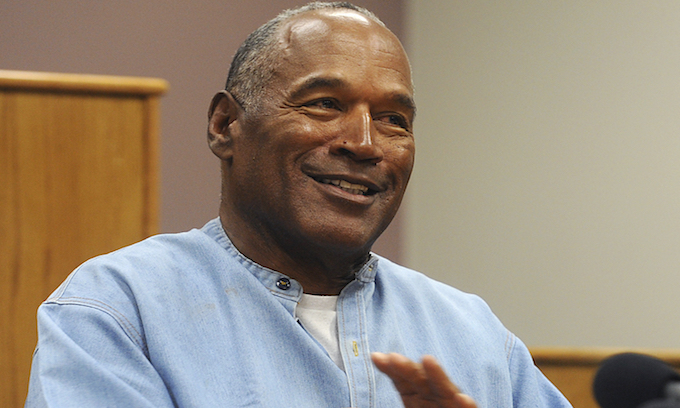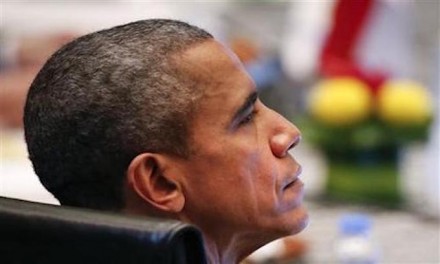Older, greyer and chubbier, a punchline for late-night TV hosts, all he apparently seeks is a quiet life and “simple pleasures” like seafood, steak and a new iPhone.
OJ Simpson walked out of prison on Sunday a free man in a country which on the surface seems ready to treat him as a subject for macabre comedy rather than psychodrama.
“He’ll be picked up … via helicopter and be flown directly to the set of Dancing with the Stars,” said Jimmy Kimmel.
“He’s been a model citizen in prison. He petitioned for books for the library, he coached a softball team, he never got in trouble. To me, that’s kind of a reason to keep him in prison – it’s the only place he’s not committing crimes,” said Trevor Noah.
The cable news countdown to the release has a theatrical air closer to soap opera than breaking news, with speculation about how many cookies Simpson ate during nine years inside.
OJ as a symbol of America’s racial divide may feel anachronistic, a cobwebbed cliche now associated with John Travolta’s wig in the dramatised TV series The People v OJ Simpson. The United States, after all, has moved on, though not necessarily forwards.
A black man occupied the Oval Office for eight years and the Los Angeles police department is no longer the overtly bigoted institution which turned LA into a racial cauldron and prompted a mostly African American jury to acquit Simpson of murder in 1995 in apparent payback for the Rodney King verdict.
Black Lives Matter, National Football League players and Donald Trump are the new protagonists in debates about race.
In this climate the 70-year-old former athlete who emerges from jail may seem more a pop culture phenomenon – a TV ratings machine – than source of actual debate about race.
But Simpson does, in fact, endure as a totemic figure, said Earl Ofari Hutchinson, an author and media critic. “OJ will always, till the end of time, be a symbol not only of racial division and polarisation but of how the justice system deals with African Americans. He’s an eternal symbol.”
Related: Oscar-winner Ezra Edelman on making his epic documentary OJ: Made in America
His acquittal for the 1994 murders of his ex-wife Nicole Brown Simpson and her friend Ron Goldman still divides Americans along racial lines, said Hutchinson. “Individuals who weren’t even born then have an opinion about OJ. Anytime I mention him on Facebook, it blows up.”
The gap has narrowed but remains stark. In a 1995 CBS poll 76% of whites thought the former FNL star was guilty while just 22% of blacks thought so. Now 79% of whites and 41% of blacks think that. Some 10% of whites and 39% of blacks think he is not guilty.
More than a decade after the murder acquittal, Simpson was sentenced to 33 years for a 2008 armed robbery and kidnapping in relation to a confrontation with two sports memorabilia dealers in a Las Vegas hotel room.
In July a Nevada state parole board granted parole, cutting his time served in the Lovelock correctional center in northern Nevada to nine years.
Simpson wished to see his family, who live in Florida, and enjoy “the very simple pleasures” of life, including eating seafood and steak and getting a new iPhone, his lawyer, Malcolm LaVergne, told ABC’s Good Morning America last week.
TV critics initially groaned last year when FX announced a 10-part dramatisation, The People v OJ Simpson, and ESPN announced an eight-hour documentary, OJ: Made in America, saying the story was over-familiar. But both gripped audiences and the latter won an Oscar.
The response surprised even the documentary director, Ezra Edelman. “I underestimated the appetite people have for this story.”
Simpson may try to shun the limelight but he will still divide America, said Hutchinson, author of Beyond OJ: Race, Sex and Class Lessons For America. “No matter how quietly he tries to live he’ll aways be a lighting rod.”
The current tumult in the NFL over protests by Colin Kaepernick and other players, in contrast, will eventually fade, said Hutchinson. “I can’t imagine people 20 years from now will be taking about Kaepernick.”
Simpson will remain in the judicial crosshairs because of a dogged campaign by the family of Goldman, the waiter murdered alongside Simpson’s ex-wife. In 1997 Simpson was found liable for the killings in civil court. He was ordered to pay $33.5m, a figure which since then has nearly doubled with interest to more than $65m, according to David Cook, an attorney for the Goldman family.
Fred Goldman, the victim’s father, recently told the Guardian that Simpson’s parole only steeled the family’s quest for justice. “Nothing ever takes away from the grief. You have a situation like this and it just adds to the feelings … he’ll be out again and we’ll start the process all over again.”
Copyright © 2017 theguardian.com. All rights reserved.
—-
This content is published through a licensing agreement with Acquire Media using its NewsEdge technology.




















Recent Comments